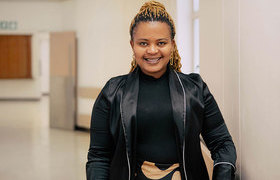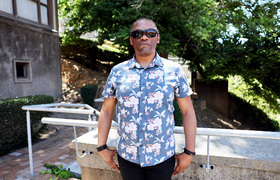World Autism Day: Giving students a space to flourish
02 April 2024 | Story Niémah Davids. Photo Pexels. Videos Boikhutso Ntsoko. Read time 7 min.
“Autism is as much part of humanity as is the capacity to dream.” – Kathleen Seidel. In light of this, the University of Cape Town (UCT) gives students with autism spectrum disorder (ASD) the power to dream big and the wings to fly.
But it takes work, and the university’s Disability Service (DS), a unit within the Office for Inclusivity & Change (OIC), is at the forefront of it – championing inclusivity and transformation in all spheres of campus life and placing the needs of UCT’s growing cohort of students with disabilities at the top of their list. This World Autism Awareness Day, observed on 2 April, UCT News spoke to the DS’s Dr Bridget Johnson, who shines a spotlight on the myriad of support systems in place for students with autism. Dr Johnson is a psychologist in the unit and her role involves ensuring that students with mental health disabilities, as well as specific learning disabilities receive reasonable academic accommodations and concessions.
“UCT is quite advanced with what it offers students with autism if one compares it to the literature out there. This is encouraging because it means that students with autism feel free to come to us [DS] and share confidential information with us because they understand that we have their best interest at heart and are here to help,” she said.
In-class support
Once the student has registered with DS, Johnson said step one is ensuring that the necessary accommodations and concessions are in place to make their in-class experience easier and enjoyable. These accommodations and concessions support students with specific learning disabilities, physical or sensory disabilities, as well as medical conditions that impact their ability to perform under timed test or examination conditions.
And the list is long – from flexible assignment deadlines, to adjusting lecture and tutorial requirements, and exempting students with ASD from group work are just some of the support services currently in place to support their needs. In addition, students with autism have access to in-class notetakers, recorded lectures, and the option to defer tests and exams if they need to.
“UCT also has dedicated quiet spaces on campus. With the Hlanganani Library across the way from us, they have a room within a room. So, if students need a quiet space, they can access that space. And if it’s too busy, we also have a day room at Disability Service [in the Steve Biko Building] for students who are experiencing sensory overload,” she said.
Extended degree programme
The university’s extended degree programme, which gives students more time to complete their degrees, with dedicated, on-hand support, benefits students with autism as well. This option is especially useful, Johnson added, because many students with ASD mask their symptoms to fit into their new environment. This leads to extreme fatigue and burnout. Therefore, they are allowed to extend their degrees.
Some, she said, also opt to take a leave of absence. So, they formally place their academic programmes on hold for a full semester or take less courses to manage any mental health and wellness challenges, without dealing with the daily demands that go hand in hand with their studies.
“A lot of students with autism feel that if they do not try and fit in, they will be seen as different and excluded. But engaging in masking and trying to be like neurotypical students actually makes them quite tired so they opt for some time out,” she said.
Navigating the space
While providing students with the necessary support to navigate their academic programmes is critical, it’s not enough and it’s not the only level of assistance the institution offers.
Johnson said it’s not uncommon for those with autism to find sharing small spaces uncomfortable. Therefore, DS ensures that those registered in the university’s residence system are allocated single rooms and facilitate the application process on their behalf. Similarly, for those students who choose not to travel on the UCT shuttle due to the noise levels and space constraints, alternative transport can be arranged. Johnson said DS also employs two full-time carers who support students with the registration process, locating lecture halls and tutorials, as well as other important areas on campus. Despite the list of support services available, which students with autism “really appreciate”, she said the designated quiet spaces are considered most important.
“I find that the quiet spaces are very important. We have students coming in here, often in distress [because of the noise]. So, we constantly need to be aware of sensory overload that leads to feelings of overwhelm and that leads to anxiety as well,” she said.
Understanding invisible disabilities
Over the years, the university has made good progress with supporting students with ASD. But there’s always scope for improvement. In the UCT context, and to enhance the in-class experience, Johnson said students with autism need lecturers to understand invisible disabilities the same way they understand visible disabilities.
“It’s that thing where the student with autism looks fine and looks like every other student in the class. So, practically, you wouldn’t know that the student has autism. Sometimes students with autism feel that when they present a verified accommodations letter, it’s as though they’re getting an advantage. [But] it’s not an advantage. It’s what they need to succeed,” she said.
Upskilling staff on how to support students with autism has already started. Johnson said DS has developed a new training module dedicated to the topic and recently facilitated an interactive workshop with academic staff in the Faculty of Humanities. The workshop provides participants with a platform to learn about ASD, ask pressing questions and receive tips on how best to manage students with autism. The training also comprises several case studies, which provide participants with real-life scenarios to improve their understanding.
“I think they found it quite valuable. A course like that at the moment is voluntary. But I think it should be compulsory. I think that would go a long way – not only to enhance everyone’s learning, but also to provide the support that students with autism desperately require,” Johnson said.
 This work is licensed under a Creative Commons Attribution-NoDerivatives 4.0 International License.
This work is licensed under a Creative Commons Attribution-NoDerivatives 4.0 International License.
Please view the republishing articles page for more information.










